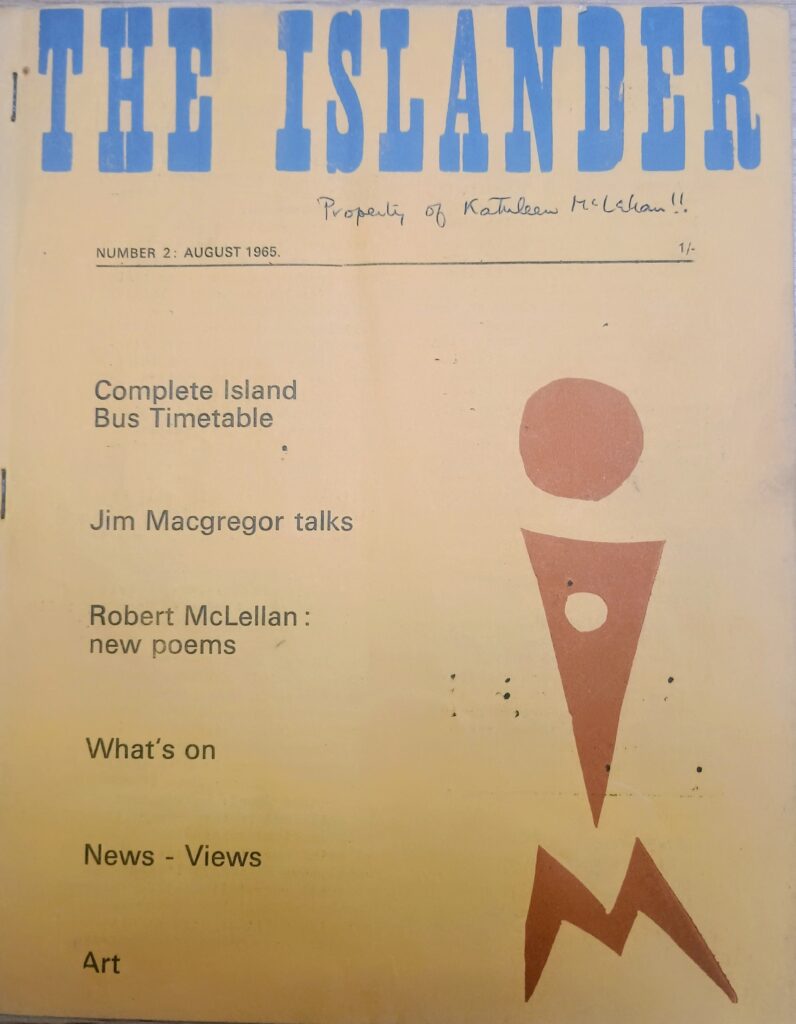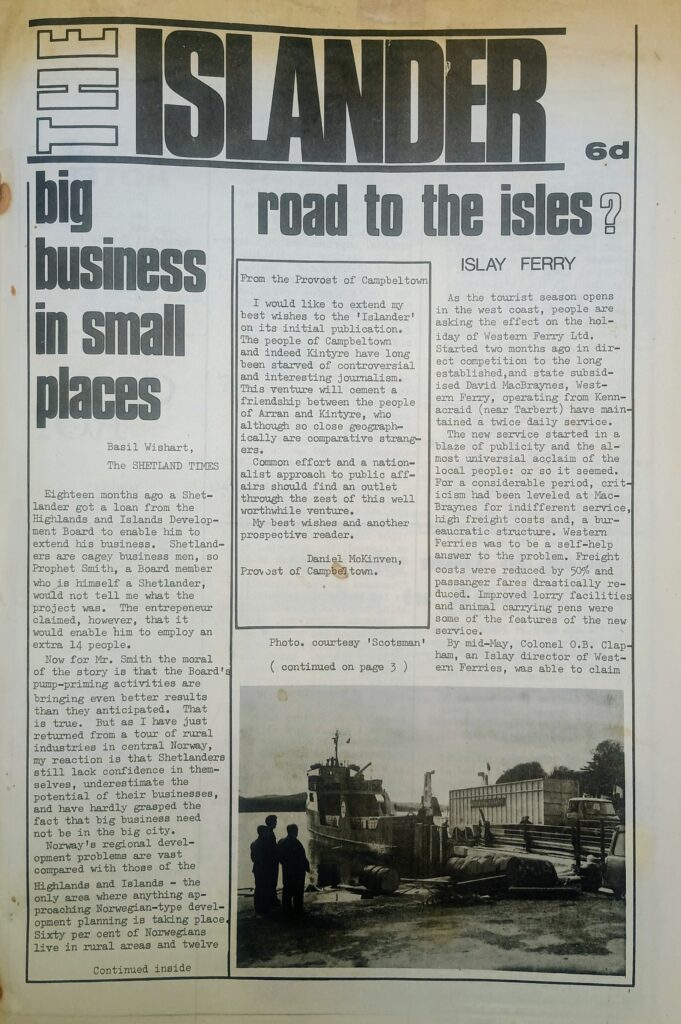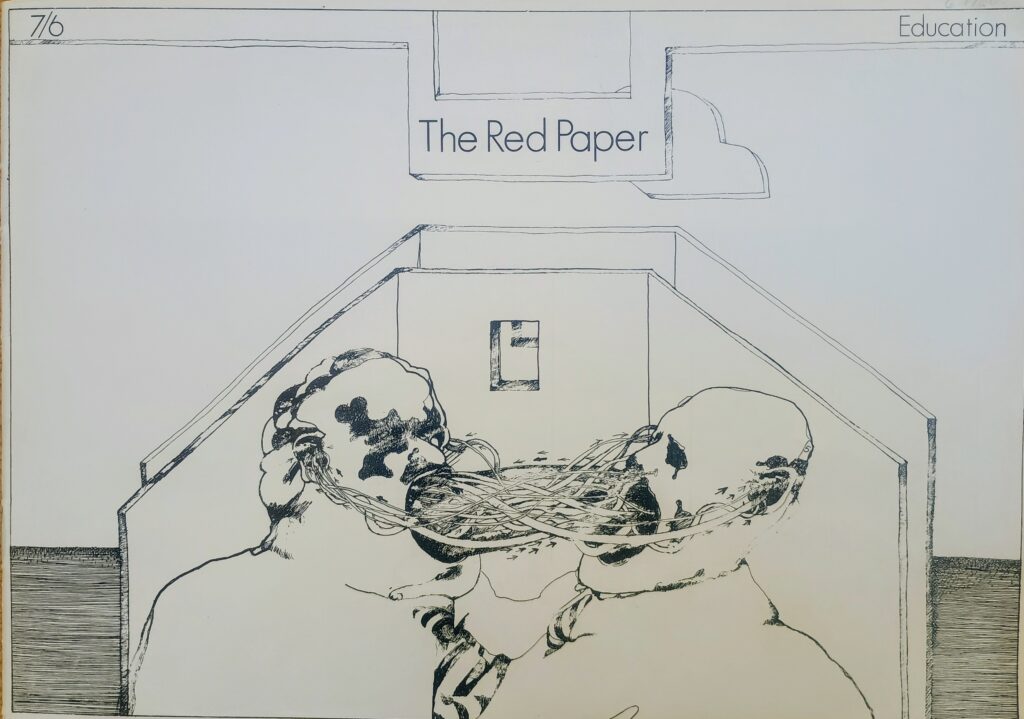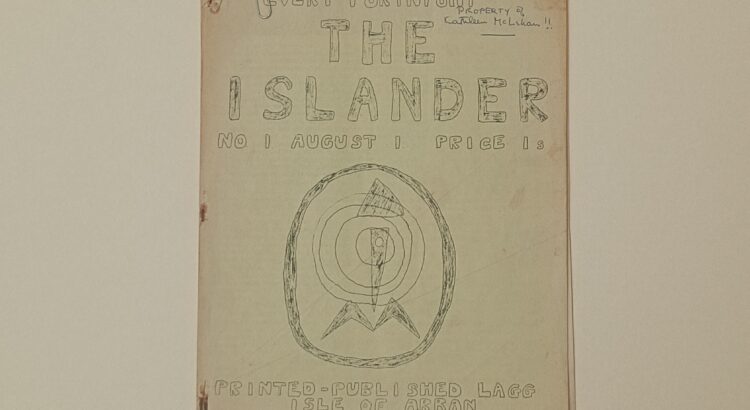
If you watched STV news between 1972 and 1989 you will almost certainly remember reporter Bob Cuddihy
Robert Anthony Cuddihy 1946-2024, known as Bob, was born in New York on 11th September 1946 and died on October 23rd, 2024, in his adopted home of Edinburgh. He used to joke that if he wrote a memoir, he would call it “Marlon Brando pushed my pram” which perfectly captures his high society origins in Manhattan.
He spent most of his life though in Scotland and much of that in Leith, Edinburgh. When the news of his death was reported The Sun called him “legendary” and the Daily Record dubbed him “iconic.” The majority of his career was spent in television but in the late 1960s and early 1970s he was also an innovative and idiosyncratic publisher on the Isle of Arran. His career as a publisher was short lived but influential and he also made a number of contacts that would be important in his later career. This is a brief look back at the life and times of Bob Cuddihy. It draws extensively from the eulogy given by Russell Galbraith his former boss at STV and the obituary published in The Scotsman written by Bernard Ponsonby, special correspondent at STV who had known Bob Cuddihy for over 35 years.
Bob Cuddihy was a well-known face on Scottish television in the 1970s and 1980s and a well kent face in Edinburgh. “Scotsman” diarist Simon Pia ironically called him the “quiet American.” Dressed in well cut suits from Gieves and Hawkes, coloured spectacles, and tasselled loafers he anything but quietly went around the hostelries and streets of Edinburgh in pursuit of a story. Whether he was covering geo-political events or dressed up as a dame to report on the start of pantomime season you did not change channels when Bob Cuddihy was on. You knew you were going to be informed, engaged, and entertained and never knew quite where he might go with a story. Local television news is an inherently ephemeral medium, often broadcast live and rarely repeated. So, we were delighted when his widow Maggie and Russell Galbraith, retired journalist, and producer at STV, visited us to donate some of Bob’s publications so we could have a tangible record of his work in our permanent collections.
Born into one of the great Irish-Catholic dynasties of America his childhood was spent in the Hamptons and uptown Manhattan. His grandfather R.J. Cuddihy , who was also Bob’s hero, had started at the American publisher’s Funk & Wagnell in 1878 as a sixteen-year-old office boy but rose to be a key figure at the company and the main stockholder. Bob Cuddihy’s early life has something of the feel of a story by F. Scott Fitzgerald, especially as it was touched by tragedy. His parents divorced and then both died in separate car crashes leaving Bob an orphan at the age of fifteen. Bob and his four siblings were sent to Britain to be educated. Here he attended Kilquhanity School in Galloway, a free school inspired by the philosophy and writings of Forfar born A.S. Neill. He attended Napier College and then the University of Edinburgh where he became a prominent figure in the nascent anti-apartheid movement, protesting when the Springboks rugby team visited Murrayfield and campaigning for the University to disinvest in South Africa.
Bob was on the student publications board at the University of Edinburgh but he had already become a publisher on the Isle of Arran whilst on holiday. The image at the top of this blog is the cover of “The Islander” no.1 August, the year of publication is not given but it is 1965. The editorial almost certainly written by Cuddihy says “one definate (sic) thing we have learned in the last ten days is that Arran can have a magazine of its own”. Clearly the young Bob had gone on holiday and in a few days decided that Arran needed a magazine and then published one. “The Islander” no.1 has a report on sheep dog trials by Elizabeth Picken; events and cinema listings; a poem called “Arran” by Robert McLellan who lived in the village of Corrie on the island and an interview with rock band the Yardbirds, who were playing on Arran conducted by Bob Cuddihy. Lead singer Keith Relf says “Scottish audiences are a rave” and guitarist Jeff Beck replies “no” when asked if he had nerves before a concert.

Issue 2 of The Islander was an altogether more professional looking publication
Issue 1 of The Islander was swiftly followed by issue 2 which demonstrated that the then teenage Cuddihy was a quick learner as it was a great advance on issue 1. Issue 2 featured advertisements from almost every business on Arran. Highlighting that the magazine included local bus timetables surely led to a few sales. The issue also included a brief biography of Cuddihy. “Bob Cuddihy is an American who has been studying at Kilquhanity House School for the past 3 years. Editor of the Islander and holidays in Lagg.” It also had a letter page which featured the single letter that they had received in response to the first issue. The Islander then ceased publication for a few years in part presumably because Cuddihy’s holiday in Lagg came to an end

The Islander returned in 1968 as a campaigning newspaper.
After a break The Islander started publication again in July 1968 but this time as a very professional and campaigning newspaper. It now had a staff and a mission, to capture the life and culture of Arran and promotes the inhabitants’ interests. The staff included George Robertson as General Manager. Robertson, now Lord Robertson, would become a Labour MP, Secretary of Defence and then Secretary General of NATO. Cuddihy had a lifelong interest in defence so must have been astonished when a lad from the Isle of Islay he had once employed became the top person at NATO. Brian Wilson was the Islay Manager for The Islander. Wilson would also become a Labour MP and minister but before that in 1972 he was the founding editor of the West Highland Free Press. This important local weekly newspaper, which continues to be published, was directly inspired by The Islander.

The Red Paper (1970) put the case for educational reform in Scotland and caused a storm.
The Islander only lasted for five issues in its new more radical incarnation, it simply was unable to pay its way. The name The Islander though survived as the publisher of “The Red Paper” in 1970 which was co-edited by Cuddihy. This was a collection of papers by experts in education that made the case for radical changes in teaching methods in Scotland. It included an article by John Aitkenhead, Bob’s headteacher in Galloway. Aitkenhead had been a guiding light for Cuddihy at probably the most difficult point in his life, and the publication was in part a thank you to him and his wife. Later Cuddihy was very happy to perform and even play the clown for the tv cameras if it would help with a story but “The Red Paper” demonstrates that his career in journalism prospered because of his intellectual range and deep curiosity.
His publishing career was only one small part of his life but we are grateful to his friend and former boss Russell Galbraith and his widow Maggie for enabling us to collect his publications and make them available to the Scottish public now and in the future. As a bonus the run of The Islander is beautifully bound as it was a presentation copy gifted by Russell to Bob. For more information about Bob Cuddihy’s life and times search for Bernard Posonby’s excellent obituary.
